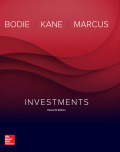
EBK INVESTMENTS
11th Edition
ISBN: 9781259357480
Author: Bodie
Publisher: MCGRAW HILL BOOK COMPANY
expand_more
expand_more
format_list_bulleted
Question
Chapter 2, Problem 2CP
Summary Introduction
To calculate: The Equivalent Taxable Yield under 34% of combined federal plus state tax bracket.
Introduction: Normally, when an investment is made, investor gets the
Expert Solution & Answer
Want to see the full answer?
Check out a sample textbook solution
Students have asked these similar questions
Skip Stephens is trying to decide whether it would be wise to consolidate his debt by borrowing funds from Syndicated Lending, a firm that he doesn’t know much about. Syndicated is an Internet lender that doesn’t post much information about the costs of the loans it offers. Some of the additional information Skip has gathered from various sources suggests the Syndicated might use such unethical practices as “bait and switch” to attract customers.
Discussion questions:
Is there an ethical problem? If so, what is it?
What are the implications if Skip borrows from Syndicated?
Should Skip borrow from Syndicated?
9-15
9-16
Chapter 2 Solutions
EBK INVESTMENTS
Ch. 2 - Prob. 1PSCh. 2 - Prob. 2PSCh. 2 - Prob. 3PSCh. 2 - Prob. 4PSCh. 2 - Prob. 5PSCh. 2 - Prob. 6PSCh. 2 - Prob. 7PSCh. 2 - Prob. 8PSCh. 2 - Prob. 9PSCh. 2 - Prob. 10PS
Ch. 2 - Prob. 11PSCh. 2 - Prob. 12PSCh. 2 - Prob. 13PSCh. 2 - Prob. 14PSCh. 2 - Prob. 15PSCh. 2 - Prob. 16PSCh. 2 - Prob. 17PSCh. 2 - Prob. 18PSCh. 2 - Prob. 19PSCh. 2 - Prob. 20PSCh. 2 - Prob. 21PSCh. 2 - Prob. 22PSCh. 2 - Prob. 1CPCh. 2 - Prob. 2CPCh. 2 - Prob. 3CPCh. 2 - Prob. 4CPCh. 2 - Prob. 5CP
Knowledge Booster
Learn more about
Need a deep-dive on the concept behind this application? Look no further. Learn more about this topic, finance and related others by exploring similar questions and additional content below.Similar questions
- Ends Mar 30 Discuss in detail, (Compare and Contrast), the various capital-budgeting tools explained in the chapter. (Payback period, Discounted Payback period, Net Present Value, Internal Rate of Return and Profitability Index). 0arrow_forwardEnds Mar 30 Discuss in detail what is Free Cash Flows and how is it calculated. Also define what is a Sunk Cost as well as an Opportunity Cost. 0arrow_forwardSubscribe Explain in detail what is a firm's Capital Structure? What is and how does a firm's Financial Policy impact its Capital Structure? Finally, what is opportunity costs and how does it affect a firm's Capital Structure?arrow_forward
arrow_back_ios
SEE MORE QUESTIONS
arrow_forward_ios
Recommended textbooks for you

Bonds Explained for Beginners | Bond Types 101; Author: TommyBryson;https://www.youtube.com/watch?v=yuKmHTgqZ5o;License: Standard Youtube License